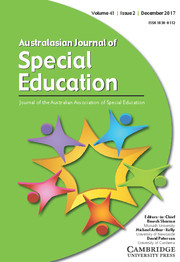No CrossRef data available.
Article contents
International Cooperation For Inclusive Education
Published online by Cambridge University Press: 26 February 2016
Abstract
Education authorities throughout the world are striving to implement the principles of inclusive education. The Malaysian Ministry of Education has adopted these principles and is presently involved in translating them into practice. As part of this program, three teachers college lecturers and an officer of the Teacher Education Division undertook an intensive short-term training course at Flinders University in South Australia. The aim of this project was to devise a course in Inclusive Education that would be taught to trainee teachers in colleges throughout Malaysia. This keynote address describes the collaborative efforts of the Malaysian and Australian lecturers who developed the course and the experiences of one of these lecturers who has introduced the course into the curriculum of the Sarawak Teachers College. There are many lessons to be learned by examining how different countries attempt to solve similar problems. A number of these lessons are explored in this address.
- Type
- Research Article
- Information
- Copyright
- Copyright © The Australian Association of Special Education 1995




